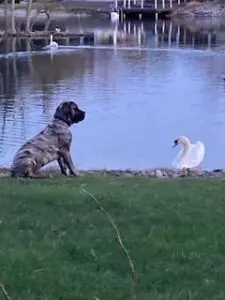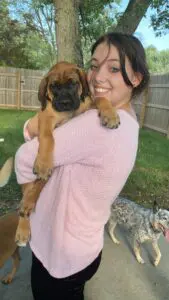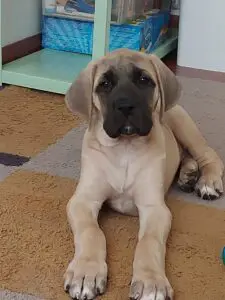Puppy Reservation Process
Thank you for your interest in our puppies.
To reserve a puppy please send us an email at mastiff@bright.net
We will send you our puppy reservation form.
You simply type your info into the form and hit reply, it comes back to us.
We will respond with a reservation confirmation as soon as possible.
No deposit required until your puppy is born.
Fredericka and Robin
When puppies are born we send out Birth Notification with photos of the mother with her puppies at two to five days of age. Also photo of the father. You will need to let us know (via email ) that you want a puppy within 72 hours of receiving your notice of birth.
Price for females is $2,000. Price for males is $2,500. When you receive the birth announcement and first photos it is time to send deposit ( half of the purchase price. )(or,if more convenient for you to pay the entire amount upfront, that is an option also)
If you have a Zelle account we prefer you use Zelle.
Zelle recognizes our email of flyingw@bright.net
We also accept Personal checks for deposit; In that case, please make your check out to Flying W Farms Kennels LLC and mail it to Fredericka Wagner P.O. 845 Piketon, Ohio. 45661;
If your deposit is not received within 14 a days of date of our email birth announcement , the puppy will go to next name on the list.
We will send new photos at Six weeks old; When you see the Six week photos the balance of payment is then due .
Method of payment, we prefer you use Zelle if you have a Zelle account. Please use Zelle no later than the day before pickup; Our cell phone service is very poor in this area and internet can be unreliable; Therefore do not count on Zelle the day of pickup.
We cannot accept any type of check for the final payment but you may pay in cash if that is more convenient for you.
If for some reason you later need to cancel, we will move you to next litter.
Price includes vet check, health certificate, microchip and first puppy shot. We deworm our puppies at two weeks of age and every two weeks thereafter until they go home. We use Liquid Panacur dewormer for puppies.
We raise our puppies in our house and they are very well socialized.
To reserve a puppy, please fill our the puppy reservation form; we need your name, phone number, your address; tell us if you want a male or female and color you want.
Please send paragraph or two about the home you are offering our puppy and be sure to tell us why you want one of our puppies. Please tell us about your family, ; do you already have a dog(s)? Photos appreciated if you would send some, not required but we like to see where the puppy will be going. If all is well, we will send you an email confirming your reservation. No deposit is due until you receive a notice that your puppy has been born.
CHECK IN WITH US EVERY NOW AND THEN TO RECONFIRM YOUR RESERVATION.
More about the FLYING W FARMS KENNELS, LLC puppy process and some additional important information:
- We will not ship puppies as cargo. We do prefer that you drive here to pick the puppy up or fly to either Cincinnati or Columbus airport (both are about 80 miles from our farm) and carry the puppy back with you in the passenger cabin of the plane.
If you cannot travel to pick your puppy up, it may be possible to for you to arrange for someone you know and trust to pick up your puppy for you. We are fine with that process as well. - We want the puppies we raise to be treated as family members, and as such they should live in the house with the family.
Safety:
Bare wood floors and tile can be slippery, and running, klutzy puppies run a risk of serious injury. Try to keep your puppy on carpet as much as possible. If you have slippery floors, just pick up several rubberized bath rugs and create islands of safety. This will also help your puppy get used to the floor.
Do not let the puppy jump off anything higher than six inches for first sixteen weeks of its life, and do all you can to minimize high-impact activity for the first year. Jumping down from heights or over things can injure rapidly developing front legs. Moderate exercise "on the flat" is fine, given you keep the safety of developing bones and joints in mind. walking, etc.
We want the puppies we breed to be treated as family members, and as such they should live in the house with the family. The dog cannot be chained, nor tethered, nor used as a guard dog for any business or non-residential establishment.


